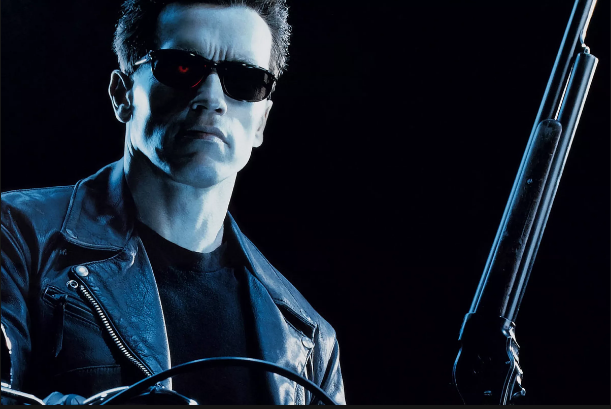"Terminator 2: Judgment Day" celebrates its 25th anniversary

Photo Carolco Pictures Inc.
On July 1, 1991, James Cameron’s world movie Terminator 2: Judgment Day kicked off. It would not be an exaggeration to say that the film immediately received the status of a cultural phenomenon, and this is one of the few cases where exacting critics and ordinary viewers think about the same . The events of the film spawned a separate universe: with innovations, serials, websites, fan fiction. Moreover, the story told in the Terminator even became the object of philosophical research in the book Terminator and Philosophy: I'll Be Back, Therefore I Am , published in 2009.
On the Internet you can find a lot of materials on the history of the creation of both Terminators, including practically original research in Russian. Also on YouTube is available a huge number of commercials, both professional and amateur. Now I would not like to repeat articles from the category of “10 little-known facts”, but I would like to dwell on the curious observation made by Philosophy Professor Mark Rowlands of the University of Miami in his book “The Philosopher on the Edge of the Universe. NF — philosophy, or Hollywood goes to the aid: philosophical problems in science fiction films ”and which, according to the author, explains the success of the film.
About 10 years before the release of Terminator 2, another cult science fiction film appeared - Blade Runner, filmed by Ridley Scott after Philip Dick’s novel “Do Androids Dream About Electricians?”. It also abundantly demonstrates the world of the future, the robots that are indistinguishable from humans, which are called replicants here, shooting, fights and other attributes of fascinating cinema are present. But - most importantly - in the finale, it turns out that the replicant, for whom the entire film is hunting, manifests the very real human qualities and at the last moment decides to save his pursuer from certain death.
The concept itself - “cyborg” - appeared relatively recently. He was brought into use in 1960 by Manfred Klines and Nathan Klein, who worked as researchers in the Dynamic Modeling Laboratory in New York. During this time, quite a lot of mass culture works appeared, in which artificial intelligence appeared, while often his behavior turned out to be hostile to man in the end. We can recall, for example, HAL 9000 from the 2001 Space Odyssey by Stanley Kubrick or the militant machines from the more philosophically sophisticated than Cameron’s film, The Matrix, directed by Wachowski. In other words, voluntarily or involuntarily, but the mass culture managed to form in general negative expectations from artificial intelligence (even Ilon Mask is afraidSkyNet), and movies with robots that appeared at the box office often came out with names like Cyborg Killer (in one of the Russian localizations of the first Terminator, it was called that).
In “Doomsday” there are several iconic scenes that completely change the perception of the terminator. In the director's version of the film, Sarah Connor and her son “modify” the T-800, introducing the cyborg into self-study mode. Moreover, this episode is further developed in two others: it is easy to recall the conversation of Terminator and John, in which the boy tells the robot why people cry or the thoughts of Sarah, who suddenly realizes that "... the terminator will never stop. He will never leave him, he will never do it hurts him, never shouts at him, does not get drunk, does not hit him and does not say: "I am too busy and I do not have time for you." He will always be there and he will die to protect him. "In other words, the cyborg became much prettier and the final movie scene and when Terminator says he understands

Photo Carolco Pictures Inc.
It is possible that it was thanks to the “humanity” of the Terminator that he became so popular, despite the efforts of popular culture, which propagandizes AI as a kind of evil that may manifest in the future. Of course, you can not ignore the skill of Cameron as a director and the magnificent entourage of the film, generously flavored with chases, explosions and time travel, which do not look completely alien. It is curious that in the continuations of the franchise, in which the T-800 took part, its “humanity” was brought to an extreme: you can recall the episode with ridiculous glasses in the third part, or even quite strange jokes in “Terminator: Genesis”, so the sense of proportion inherent mass audience, in general, it does not change. Thus, according to Mark Rowlands, cultural expectations in the early 1990s were really far from the gloomy skepticism which is usually attributed to the consumer society. People still want to see a strong and kind hero, at the same time with a sense of measure and taste, which, probably, can only be shown by a very small number of modern directors.
